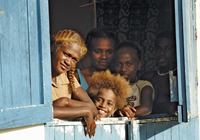This joint ANZ report Surviving the global recession: strengthening economic growth and resilience in the Pacific, finds that Pacific Island countries are experiencing lower growth, a worsening macroeconomic outlook and increased poverty. This report is one of two reports prepared for the Pacific Island Forum Leaders Meeting in Cairns. The second report – Tracking Development and Governance in the Pacific, 2009 – complements this report, by focussing on the Millennium Development Goals (MDGs) and development coordination.
The impact of the global recession in the Pacific has been mainly felt through lower prices and demand for commodities, pressure on tourism and falls in remittance flows and in the value of offshore national trust funds.
The report highlights that the global recession has exposed a range of underlying structural weaknesses in many Pacific Island countries which have exacerbated the impact of the recession and constrained countries' ability to respond. A number of countries were already stressed as a result of the high food and fuel prices of 2008 with high inflation, falling foreign reserves and unsustainable budget deficits.
As well, the report shows that economic growth, and growth per capita in the Pacific has been generally low, or negative, and people in a number of countries are now worse off than over a decade ago. The report shows that without substantive improvements in broad based and inclusive growth, countries will have limited capacity to strengthen progress against the MDGs.
But some countries – such as Vanuatu - are demonstrating that improvements can be achieved, and with improved economic management, political stability, stronger governance better services and structural reform, Pacific Island countries can better deal with shocks such as the global recession.
The report highlights that the main challenge for countries in responding to the global recession is to:
- Adjust to reduced revenues and offshore income in a way that safeguards macroeconomic stability whilst protecting funding for core services, and targeted support for the most vulnerable; and
- At the same time continue fiscal and other reforms to improve competitiveness, to build more resilient broad-based economic growth.
The report sets out a four pillar framework for response:
- the immediate priority of safeguarding macroeconomic stability, principally through fiscal adjustment
- strengthening budgetary management, protecting core services and targeted programs to assist the vulnerable
- continuing reforms to improve competitiveness and underpin longer term growth and development;
- using country policy responses as the framework for coordinated development assistance from development partners
The report suggests that by implementing reforms countries can achieve levels of growth well in excess of those of the last decade. This 'growth dividend' will put countries in a good position to weather future crises, gain from future global growth and make a dramatic difference to the achievement of the MDGs.
Drawing on the experience of Vanuatu, the report shows that over the last five years with reform, sound economic management, and political stability, significant improvements in economic growth can be achieved, and this can then help support the resilience to respond to economic shocks, and support the people's ongoing development.
The report suggests that by implementing those reforms already highlighted by the Forum Economic Ministers and in the Pacific Plan, countries can achieve levels of growth well in excess of those of the last decade. Slowing reforms because of the global recession could put countries in a worse position in the longer term.
For more information:
Report: Surviving the global recession: strengthening economic growth and resilience in the Pacific
Report: Tracking Development and Governance in the Pacific, 2009

